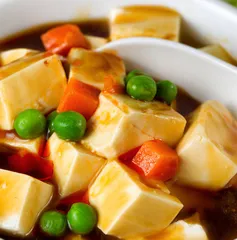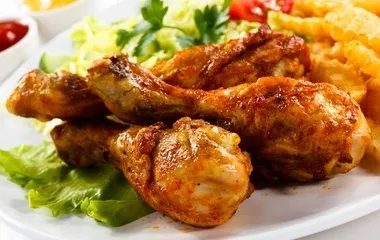Autumn moisturizing and healthy vegetarian vegetables lotus pond stir-fried
Recommendation of this issue: The atlas of practices for fried lotus pond>>

Lotus root 100g; about 70 calories

carrot 40g; about 15 calories
Excipients:

fungus 30 g; about 8 calories

lily 10 g; about 10 calories

celery 25 g; about 3 calories
Seasonings:

A little salt

Total calories: 80 calories/person-More calories query Your body needs calories
Lotus pond stir-fried-principle of losing weight Autumn is the time for fresh lotus root to be on the market. In addition to containing a large amount of carbohydrates, fresh lotus root is also rich in protein, various vitamins and minerals. There has long been a saying among the people that "newly picked tender lotus root is better than the doctor." For the elderly, autumn lotus root is a good ingredient for nourishing the stomach, nourishing yin, strengthening the spleen and replenishing qi.
Lotus pond stir-fried is an autumn health dish mainly composed of lotus root. The matching of color and nutrition is very particular, the calories are not high, and it is a classic among vegetarian dishes in terms of color, nutrition or taste.
Lotus pond stir-fried-making steps

1 Preparing materials
1 lotus root, half carrot, 2 fungus, 1 lily, 1 parsley. A little garlic and salt, and a proper amount of water and starch.

2 soak fungus
Soak the fungus in cold water, wash it, and tear it into small flowers; remove the brown part of the lily, break it into small petals, and wash it for later use.

3 Cut lotus root slices
Peel the lotus root and cut it into thin slices; wash the carrots and slice it; remove the leaves and wash the celery and cut it into small pieces; slice the garlic.

4 Blanking water
Add appropriate amount of water to the pan and bring it to a boil, add a little oil and salt; add carrots, fungus, celery, lotus root, and lily in turn, and blanch quickly; remove it with cold water and strain dry.

5 stir-fry
Put a little oil in the pan, and when the oil is 70% hot, add garlic slices and stir-fry until fragrant; put all the ingredients together into the pan, stir fry quickly for two minutes, add a little salt to taste, and add appropriate amount of water starch to thicken.

6 Completed
Be sure to stir fry quickly to ensure a crisp taste; the ingredients of this dish can also be replaced with yams, water chestnuts, lotus beans, etc.
Share it on my Weibo
Nutrition expert comments

This issue's consultant Zhang Ailing, weight loss case manager and full-time diabetes nurse, Hetang Xiaochao, is rich in nutrients and low in calories. It is a classic vegetarian dish in autumn.
Healthy in autumn, the diet should be light
Zhang Ailing: The sugar content of lotus root is not very high, and it also contains a large amount of vitamin C and dietary fiber. It is very beneficial for people with weak diseases such as liver disease, constipation, and diabetes. Vegetables such as carrots, lilies, and fungus are rich in nutrients and also have anti-cancer effects.>> See more ways to lose weight